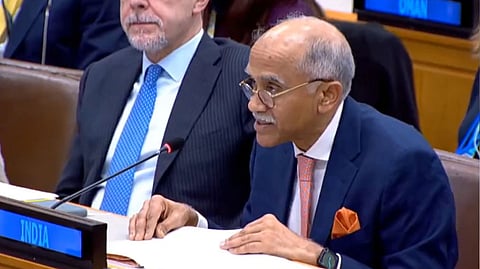

NEW DELHI: India has rebutted Pakistan's claims at the United Nations regarding the Indus Waters Treaty (IWT), accusing Islamabad of repeatedly violating the spirit of the agreement through decades of hostility, including wars and state-sponsored terrorism.
India also cited that the decades-old water-sharing pact is misaligned with present-day realities, including the urgent need for clean energy, the impacts of climate change, and shifting demographic pressures.
Speaking at a UN Security Council Arria Formula meeting on 'Protecting Water in Armed Conflict – Protecting Civilian Lives,' India's Permanent Representative to the UN, P Harish, said, "We are constrained to respond to the disinformation being carried out by the delegation of Pakistan with regard to the Indus Waters Treaty. India has always acted in a responsible manner as an upper riparian state."
Harish said that the 1960 treaty, which was entered into in good faith, had been undermined by Pakistan’s consistent aggression. "Pakistan has violated the spirit of the treaty by inflicting three wars and thousands of terror attacks on India," he said, referencing the recent April 22 terror attack in Pahalgam, Jammu and Kashmir, that left 26 civilians dead.
In response to that attack, India had announced it would suspend the Indus Waters Treaty until Pakistan "credibly and irrevocably" ends support for cross-border terrorism.
"Pakistan's state-sponsored cross-border terrorism in India seeks to hold hostage the lives of civilians, religious harmony and economic prosperity," Harish stated. He added that over the last 40 years, more than 20,000 Indian lives have been lost due to terror attacks originating from Pakistan.
Harish said India had repeatedly asked Pakistan to renegotiate aspects of the treaty to reflect contemporary realities—including growing water needs, clean energy requirements, climate change, and demographic pressures—but Islamabad had refused.
He also highlighted how modern dam infrastructure technology now ensures safer and more efficient operations, yet Pakistan continues to block any modifications.
He cited the 2012 terror attack on the Tulbul Navigation Project as another example of how terrorism threatens civilian infrastructure and lives.
Earlier, at a separate UN Security Council open debate on the protection of civilians, Harish responded sharply to Pakistan’s ambassador, Asim Iftikhar Ahmad, who raised the Kashmir issue and recent Indo-Pakistani tensions.
Ministry of External Affairs too had reiterated before a parliamentary committee that India’s decision to suspend the treaty was justified. "It is only natural and well within India’s right to hold the treaty in abeyance when the fundamental ground situations have changed completely," the MEA said.
Foreign Secretary Vikram Misri, in his briefing to the committee and Indian delegations sent to 33 countries and the European Union, emphasized that Pakistan’s continued terrorism and refusal to engage in treaty renegotiation had eroded the foundation of goodwill and friendship the treaty was built upon.
"The unrelenting cross-border terrorism from Pakistan interferes with our ability to exploit the treaty as per its provisions," the MEA said, highlighting that the agreement, rooted in the engineering techniques of the 1950s, must be modernized to address climate change, glacier melt, water variability, and clean energy demands.